Tropical Malady (Apichatpong Weerasethakul, 2004)
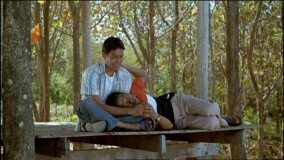 After only a few films, it’s obvious
that Thai filmmaker Apichatpong “Joe” Weerasethakul has no interest in the
conventions of narrative cinema. With Mysterious Object at Noon, a film
that seemed at first to be a harrowing documentary before it embarked on a
shifting, multi-narrator fictional tale, and Blissfully Yours, an
idyllic, erotic, yet mundane, outing that unfolded largely in real time, he’s
stunted audience expectation while conveying a semi-rural picture of Thailand
that’s unmistakably his own. Now, with Tropical Malady, Apichatpong
continues to grow as a filmmaker, creating this time a work of nearly
unparalleled ambition and remarkable control, despite what's perhaps his most confounding
narrative rug-pulling yet. Divided into two distinct, yet thematically linked
parts, Tropical Malady complexly tells the story of the emotional
development of a relationship between Keng, a solider in the Thai army, and
Tong, a farm boy that Keng meets during his duties. Its first half assumes the
mode of a relatively conventional gay romance but its second extends the themes
established there into a lyrical expansion of the film's prior concerns. With
this film, Apichatpong is working on so many levels that at first glance exact
attitude or meaning becomes difficult to pin down, since each explanation
seems to reduce other, somewhat valid readings. Such density is a blessing,
however, and a film that so blatantly challenges us yet has the goods to back up
such a test of an audience's ability is a rarity. It’s taken me four viewings to reach the
point where I felt I could adequately and succinctly describe its effect on me,
yet for all of the complexity of Malady’s defiantly modern mode of
storytelling, it hasn’t forgotten its roots.
After only a few films, it’s obvious
that Thai filmmaker Apichatpong “Joe” Weerasethakul has no interest in the
conventions of narrative cinema. With Mysterious Object at Noon, a film
that seemed at first to be a harrowing documentary before it embarked on a
shifting, multi-narrator fictional tale, and Blissfully Yours, an
idyllic, erotic, yet mundane, outing that unfolded largely in real time, he’s
stunted audience expectation while conveying a semi-rural picture of Thailand
that’s unmistakably his own. Now, with Tropical Malady, Apichatpong
continues to grow as a filmmaker, creating this time a work of nearly
unparalleled ambition and remarkable control, despite what's perhaps his most confounding
narrative rug-pulling yet. Divided into two distinct, yet thematically linked
parts, Tropical Malady complexly tells the story of the emotional
development of a relationship between Keng, a solider in the Thai army, and
Tong, a farm boy that Keng meets during his duties. Its first half assumes the
mode of a relatively conventional gay romance but its second extends the themes
established there into a lyrical expansion of the film's prior concerns. With
this film, Apichatpong is working on so many levels that at first glance exact
attitude or meaning becomes difficult to pin down, since each explanation
seems to reduce other, somewhat valid readings. Such density is a blessing,
however, and a film that so blatantly challenges us yet has the goods to back up
such a test of an audience's ability is a rarity. It’s taken me four viewings to reach the
point where I felt I could adequately and succinctly describe its effect on me,
yet for all of the complexity of Malady’s defiantly modern mode of
storytelling, it hasn’t forgotten its roots.
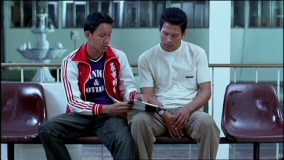 Circling around the moment when Eros
meets intimacy, where romance meets friendship, and where you stop thinking of
yourself as an individual and start thinking of yourself as part of a couple, Tropical
Malady is easier to follow in its first half, which introduces us to Keng
and Tong. As their friendship tentatively blossoms into love, this sequence
plays out as a series of magic moments, each conveyed with extraordinary
attention to environmental detail and emotional nuance. That’s not to say that
it’s an unbridled romance, though. Cropping up from time to time, there’s
the man who reminds Keng of his more frivolous romantic past, and just as
importantly there are small resistances that can be noted in Tong’s attitudes
and body language. The two men are clearly heading into a romantic
relationship, but Tong deflects both Keng’s physical advances and his
mother’s suggestion that Keng is falling for him. As their flirtation
advances, the boyish Tong adopts a playful manner in his interactions with Keng
that becomes an obvious defense mechanism.
Even when the two men fondle each other in a movie theater or proclaim
their affection, Tong is sure to leave the path to escape open by turning it
into a small joke. Throughout the
first half of the film, despite his obvious affection for Keng, he seems a
heartbeat away from writing off the more serious side of their relationship. As such, there’s a mild, noncommittal anxiety present even in the
film’s most idyllic scenes, and that unease only intensifies as the film moves
into its second half.
Circling around the moment when Eros
meets intimacy, where romance meets friendship, and where you stop thinking of
yourself as an individual and start thinking of yourself as part of a couple, Tropical
Malady is easier to follow in its first half, which introduces us to Keng
and Tong. As their friendship tentatively blossoms into love, this sequence
plays out as a series of magic moments, each conveyed with extraordinary
attention to environmental detail and emotional nuance. That’s not to say that
it’s an unbridled romance, though. Cropping up from time to time, there’s
the man who reminds Keng of his more frivolous romantic past, and just as
importantly there are small resistances that can be noted in Tong’s attitudes
and body language. The two men are clearly heading into a romantic
relationship, but Tong deflects both Keng’s physical advances and his
mother’s suggestion that Keng is falling for him. As their flirtation
advances, the boyish Tong adopts a playful manner in his interactions with Keng
that becomes an obvious defense mechanism.
Even when the two men fondle each other in a movie theater or proclaim
their affection, Tong is sure to leave the path to escape open by turning it
into a small joke. Throughout the
first half of the film, despite his obvious affection for Keng, he seems a
heartbeat away from writing off the more serious side of their relationship. As such, there’s a mild, noncommittal anxiety present even in the
film’s most idyllic scenes, and that unease only intensifies as the film moves
into its second half.
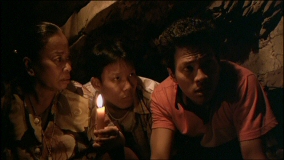 The first half of Tropical Malady ends
as Keng leaves for the country, his furlough expired, with Tong and Keng’s
relationship at a point where it’s been mutually acknowledged but not yet
consummated. The latter half, dubbed A Spirit’s Path in the movie’s
second title sequence, marks a distinct stylistic break from the first, adopting
much darker imagery and a soundtrack that remains largely wordless. This equally
remarkable passage shows Keng on a highly sexualized chase after the tiger
spirit (embodied by Tong) that’s been terrorizing the village that Keng has been
assigned to protect. This sequence feels like a dream or a fantasy that his character’s
had after the events in the first half of the film, yet it’s so intensely
realized and so undeniably relevant that to write it off as such is to do the
film a great disservice. It’s best, I think, to experience the two parts of
the film as one continuous story, with the first half documenting country-boy
Tong’s slow acceptance of his homosexuality and indoctrination to the city and
the latter half poetically detailing Keng’s exotic confrontation of the ideal
of true love (as opposed to his past empty carnality) and the way that merging
with another, body and soul, threatens to erase his own identity. Besides, there
are strong hints, such as the emergence of the naked man in the film’s first
scene or the hum of the motorcycle in its final shot that encourage such a
unified reading.
The first half of Tropical Malady ends
as Keng leaves for the country, his furlough expired, with Tong and Keng’s
relationship at a point where it’s been mutually acknowledged but not yet
consummated. The latter half, dubbed A Spirit’s Path in the movie’s
second title sequence, marks a distinct stylistic break from the first, adopting
much darker imagery and a soundtrack that remains largely wordless. This equally
remarkable passage shows Keng on a highly sexualized chase after the tiger
spirit (embodied by Tong) that’s been terrorizing the village that Keng has been
assigned to protect. This sequence feels like a dream or a fantasy that his character’s
had after the events in the first half of the film, yet it’s so intensely
realized and so undeniably relevant that to write it off as such is to do the
film a great disservice. It’s best, I think, to experience the two parts of
the film as one continuous story, with the first half documenting country-boy
Tong’s slow acceptance of his homosexuality and indoctrination to the city and
the latter half poetically detailing Keng’s exotic confrontation of the ideal
of true love (as opposed to his past empty carnality) and the way that merging
with another, body and soul, threatens to erase his own identity. Besides, there
are strong hints, such as the emergence of the naked man in the film’s first
scene or the hum of the motorcycle in its final shot that encourage such a
unified reading.
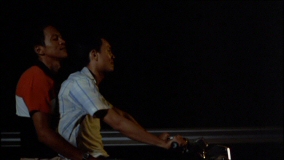 Symbolically, the two men represent what
I’ll describe in simple terms as “modernity” and “myth”. Throughout
the film, we’re presented images in which these two seemingly diametric
notions collide, yet somehow rest in unity. Some of these collisions, like the
Christmas lights strewn across a religious shrine or the casual mention of
“Who Wants to Be a Millionaire” in the middle of a retelling of an old folk
tale, are humorous, but consistently they’re presented in a way that feels
less like an either/or dichotomy than a prescient glance toward the ultimate
consummation of these two beings. The men themselves undergo transformations
that smear the notions of their identity that existed at the film’s start.
Keng’s devolution in the second half is made incredibly evident. Physically,
his uniform is stripped away layer by layer as he continues his pursuit,
reducing him to the point where he begins to crawl on all fours. Spiritually, he
undergoes an even more radical shift toward the mythic, and finds himself
talking to animals and seeing ghosts. Since Tong’s growth in the first half of
the film is grounded in his acceptance of reality, it is necessarily more
mundane, yet it’s just as astutely detailed. We watch as this farm boy learns
to drive and heads to the city to search for a job, and through his gradual
acceptance of his sexuality (no out-of-the-closet melodrama here!) we can
observe his emotional growth. As much as the film is about Tong and Keng’s
love, it’s about the attempt to harmonize their two vastly different
lifestyles, each of which is present alongside the other in modern Thai culture.
Symbolically, the two men represent what
I’ll describe in simple terms as “modernity” and “myth”. Throughout
the film, we’re presented images in which these two seemingly diametric
notions collide, yet somehow rest in unity. Some of these collisions, like the
Christmas lights strewn across a religious shrine or the casual mention of
“Who Wants to Be a Millionaire” in the middle of a retelling of an old folk
tale, are humorous, but consistently they’re presented in a way that feels
less like an either/or dichotomy than a prescient glance toward the ultimate
consummation of these two beings. The men themselves undergo transformations
that smear the notions of their identity that existed at the film’s start.
Keng’s devolution in the second half is made incredibly evident. Physically,
his uniform is stripped away layer by layer as he continues his pursuit,
reducing him to the point where he begins to crawl on all fours. Spiritually, he
undergoes an even more radical shift toward the mythic, and finds himself
talking to animals and seeing ghosts. Since Tong’s growth in the first half of
the film is grounded in his acceptance of reality, it is necessarily more
mundane, yet it’s just as astutely detailed. We watch as this farm boy learns
to drive and heads to the city to search for a job, and through his gradual
acceptance of his sexuality (no out-of-the-closet melodrama here!) we can
observe his emotional growth. As much as the film is about Tong and Keng’s
love, it’s about the attempt to harmonize their two vastly different
lifestyles, each of which is present alongside the other in modern Thai culture.
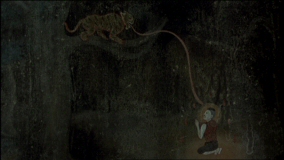 Yet it’s more than just that. After
all, Keng’s entry onto a mystic, metaphysical plane in which he can truly love
taken with Tong’s owning up to the physical reality of his identity
overpoweringly demonstrates the need for both carnality and companionship to
achieve a true union. “I give you my spirit, my flesh and my memories. Every
drop of my blood sings our song. A song of happiness. There… do you hear
it?”, the final words of the film, are anything but a letdown after an
unbearable buildup. The rush of the mythic closing moments of Tropical Malady,
in which its myriad themes coalesce into the orgasmic consummation of their
infinite promise, is one of the most transcendent expressions of love in all of
cinema. For a brief, exalted moment, Tropical Malady achieves an ideal.
Through his unconventional means, Apichatpong poetically expresses the
transformative quality of love, realizing a kind of intense profundity that
simply could not be reached in any other medium.
Yet it’s more than just that. After
all, Keng’s entry onto a mystic, metaphysical plane in which he can truly love
taken with Tong’s owning up to the physical reality of his identity
overpoweringly demonstrates the need for both carnality and companionship to
achieve a true union. “I give you my spirit, my flesh and my memories. Every
drop of my blood sings our song. A song of happiness. There… do you hear
it?”, the final words of the film, are anything but a letdown after an
unbearable buildup. The rush of the mythic closing moments of Tropical Malady,
in which its myriad themes coalesce into the orgasmic consummation of their
infinite promise, is one of the most transcendent expressions of love in all of
cinema. For a brief, exalted moment, Tropical Malady achieves an ideal.
Through his unconventional means, Apichatpong poetically expresses the
transformative quality of love, realizing a kind of intense profundity that
simply could not be reached in any other medium.
94
08.03.05
Jeremy Heilman